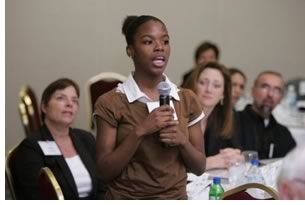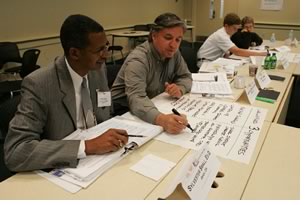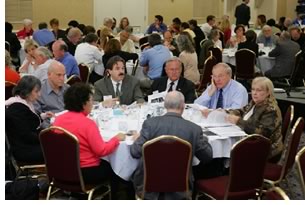

11/2005
200 stakeholders gather to discuss challenges and opportunities
 Approximately
200 teachers, students, school administrators, education advocates, elected
officials, community planners, and architects gathered in Washington,
D.C., October 6–8 to share ideas about the school of the future. The
National Summit on School Design, jointly hosted by the American Architectural
Foundation (AAF) and KnowledgeWorks Foundation, offered stakeholders
a platform to discuss challenges, opportunities, and trends in schools
and communities throughout the U.S. “The schools we design and
build are lifelong investments for the communities they serve,” said
AAF President and CEO Ronald Bogle. “We need to engage all school
and community stakeholders in a dialogue as to how these facilities best
support learning for the 21st century.”
Approximately
200 teachers, students, school administrators, education advocates, elected
officials, community planners, and architects gathered in Washington,
D.C., October 6–8 to share ideas about the school of the future. The
National Summit on School Design, jointly hosted by the American Architectural
Foundation (AAF) and KnowledgeWorks Foundation, offered stakeholders
a platform to discuss challenges, opportunities, and trends in schools
and communities throughout the U.S. “The schools we design and
build are lifelong investments for the communities they serve,” said
AAF President and CEO Ronald Bogle. “We need to engage all school
and community stakeholders in a dialogue as to how these facilities best
support learning for the 21st century.”
Attendees at the three-day conference participated in panel discussions and heard keynote speaker Russell Ackoff, PhD, author and professor emeritus of the Wharton School, discuss “Doing the Wrong Thing Right.” According to Ackoff, “Schools ought to be about learning, not teaching. Far too often, society trains people to give an answer that is expected, stifling creativity.” Robert Ivy, FAIA, editor-in-chief of Architectural Record moderated an industry panel that explored the impact of advances in technology, ventilation, and furnishings for the learning environment. National Public Radio’s Michele Norris addressed educational opportunities in “Trends Affecting the Future of School Design,” a panel discussion that featured noted school design experts and activists.
 Trends in schools and communities
Trends in schools and communities
Attendees also explored school design concerns through workshops using
hypothetical community scenarios that were reflective of current issues.
Among the identified trends facing today’s schools and communities
were advances in technology, issues of equity and accountability, smaller
schools, and the “city of learning.” Newer, pervasive technologies
such as portable computing and wi-fi are rapidly changing and broadening
the traditional learning environment while providing maximum flexibility
and adaptability for students and teachers.
David Sciarra, executive director of the Education Law Center, cited equity and accountability—in family support, teacher qualification and support, school facilities, budgeting, and community leadership—as critical to school and student success. Smaller schools have been shown to promote stronger relationships between students, parents, and teachers and, according to Roy Strickland, architect and urban design professor at the University of Michigan, they offer more opportunities for educational customization. The trend toward the “city of learning” represents the critical role schools play in community design and how a city’s assets can support broad-based learning.
 Preliminary findings
Preliminary findings
Preliminary findings from the conference show that attendees reached
consensus on the importance of creating community-based learning models,
resource distribution equity, and community involvement in the design
process. Participants agreed that a well-designed school should be
safe and healthy; “smart,” clean, and green; a center of
community; based on a public process; practical, cost-effective, and
flexible; and supportive of teaching and learning. According to attendee
Christian Long, director of learning environments for Huckabee Inc.,
Fort Worth, “The type of learning and dialogue we have been engaged
in could be seen as an ideal model for what the schools of the future
should be: interactive, experiential, and dynamic.”
The National Summit on School Design is part of the AAF’s “Great Schools by Design” initiative. Launched two years ago, the goal of the program is to improve the quality of America’s schools by promoting good design and collaboration in the design process, and providing leading-edge resources to local community leaders.
Copyright 2005 The American Institute of Architects.
All rights reserved. Home Page ![]()
![]()
 |
||
For additional results from the summit or information on the AAF, visit www.archfoundation.org. Ohio-based KnowledgeWorks provides funding and leadership for education initiatives and seeks to create and improve educational opportunities. Information on their initiatives can be found at www.kwfdn.org. AIArchitect thanks Aaron Smith for his assistance with this article.
|
||